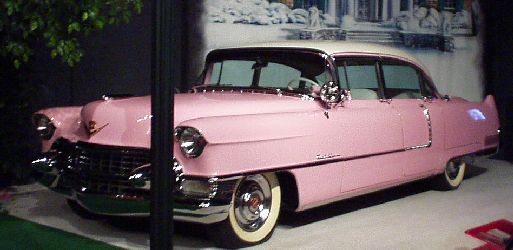Chuck Berry first recorded the song in 1955. Here he is on Youtube in an undated performance which sounds like it might date back that far.
There are many covers, including one by Simon & Garfunkle at Central Park in 1981.
Here's the lyric:
Maybellene
Maybellene, why can’t you be true?
Oh maybellene, why can’t you be true?
You’ve started back doing the things you used to do.
As I was motivatin’ over the hill
I saw maybellene in a coup de ville.
A cadillac a-rollin’ on the open road,
Nothin’ outrun my v8 ford.
The cadillac doin’ ’bout ninety-five,
She’s bumper to bumber rollin’ side by side.
Maybellene, why can’t you be true?
Oh maybellene, why can’t you be true?
You’ve started back doing the things you used to do.
Pink in the mirror on top of the hill,
It’s just like swallowin’ up a medicine pill.
First thing I saw that cadillac grille
Doin’ a hundred and ten gallopin’ over that hill.
Offhill curve, a downhill stretch,
Me and that cadillac neck by neck.
Maybellene, why can’t you be true?
Oh maybellene, why can’t you be true?
You’ve started back doing the things you used to do.
The cadillac pulled up ahead of the ford,
The ford got hot and wouldn’t do no more.
It then got cloudy and it started to rain,
I tooted my horn for a passin’ lead
The rain water blowin’ all under my hood,
I knew that was doin’ my motor good.
Maybellene, why can’t you be true?
Oh maybellene, why can’t you be true?
You’ve started back doing the things you used to do.
The motor cooled down, the heat went down
And that’s when I heard that highway sound.
The cadillac a-sittin’ like a ton of lead
A hundred and ten a half a mile ahead.
The cadillac lookin’ like it’s sittin’ still
And I caught maybellene at the top of the hill.
Maybellene, why can’t you be true?
Oh maybellene, why can’t you be true?
You’ve started back doing the things you used to do.


Sources: http://arted.osu.edu/160/images/50rnr/berry.gif and http://www.rocksbackpages.com/furniture/artists/berry_chuck.jpg}



 I didn't know anyone who owned a pink Cadillac, but I used to service a Series 62 black '54 four-door sedan when I worked summers in the local garage.
I didn't know anyone who owned a pink Cadillac, but I used to service a Series 62 black '54 four-door sedan when I worked summers in the local garage.
Extract from the "Chuck Berry" page
On the advice of blues great singer Muddy Waters, Chuck contacted Leonard Chess of Chess Records in Chicago. Chess and his house producer Willis Dixon were intrigued by "Ida Red", the piece that was performed by the Sir John's Trio and written by Berry. The song was revamped, named "Maybellene" and recorded in 1955. Alan Freed, a very popular disc-jockey, was given a copy of the single that he played for two hours continuously on his show in New York on radio station WINS. "Maybellene" went on to sell in the excess of one million copies and grabbed the number one spot on the R&B chart as well as number five on the Hot 100.
Berry's success could not be fully enjoyed, however, because the copyright for "Maybellene" was not his alone. It also listed the names of Alan Freed and Russ Frato, resulting in a reduced level of royalty payments to Berry. Around the same time, Chuck also became aware that his manager was pilfering funds from Berry's live performances. Having developed a hard-edged attitude toward show business, Berry soon acquired a reputation for being difficult to work with because of his intense desire to be in control of his own affairs.
Extract from the Chuck Berry article in Wikipedia
In December 1959, after scoring a string of hit songs and while touring often, Berry had legal problems after he invited a 14-year-old Apache waitress whom he met in Mexico to work as a hat check girl at Berry's Club Bandstand, his nightclub in St. Louis. After being fired from the club, the girl was arrested on a prostitution charge and Berry was arrested under the Mann Act. Berry was convicted, fined $5,000 and sentenced to five years in prison. This event, coupled with other early rock and roll scandals — such as Jerry Lee Lewis' marriage to his 13-year-old cousin and Alan Freed's payola conviction — gave rock and roll an image problem that limited its acceptance into mainstream U.S. society. However, when Berry was released from prison in 1963, his musical career enjoyed a resurgence due to many of the British Invasion acts of the 1960s — most notably the Beatles and the Rolling Stones — releasing cover versions of Berry's songs. In 1964–65 Berry resumed recording and placed six singles in the U.S. Hot 100, including "No Particular Place To Go" (#10), "You Never Can Tell" (#14), and "Nadine" (#23).Addendum: Why motivatin' and not motorvatin'? I don't feel a lack of the latter, so much as the former.
Another: Chuck Berry took the melody for Maybellene from a 19th-century fiddle tune called Ida Red. According to Wikipedia, he'd heard it in 1938 done by Bob Willis. Here's a Youtube of Willis and his Texas Playboys.
One more: Why Mabellene and not Maybelline? The nice Wikipedia article on the song says the two are often confused.




No comments:
Post a Comment